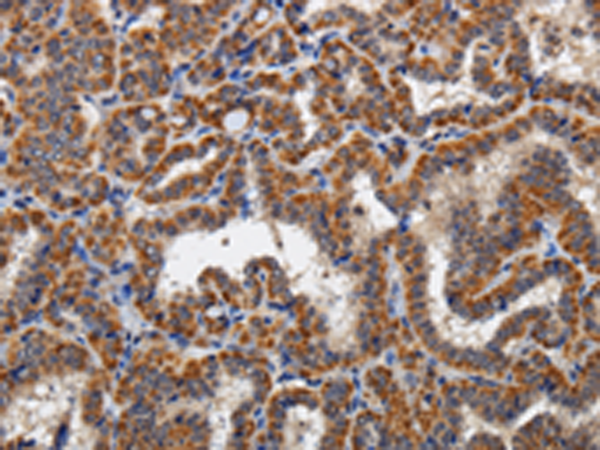

| WB | 咨询技术 | Human,Mouse,Rat |
| IF | 咨询技术 | Human,Mouse,Rat |
| IHC | 1/100-1/300 | Human,Mouse,Rat |
| ICC | 技术咨询 | Human,Mouse,Rat |
| FCM | 咨询技术 | Human,Mouse,Rat |
| Elisa | 1/2000-1/10000 | Human,Mouse,Rat |
| Aliases | hK6; Bssp; Klk7; SP59; PRSS9; PRSS18 |
| Host/Isotype | Rabbit IgG |
| Antibody Type | Primary antibody |
| Storage | Store at 4°C short term. Aliquot and store at -20°C long term. Avoid freeze/thaw cycles. |
| Species Reactivity | Human |
| Immunogen | Fusion protein of human KLK6 |
| Formulation | Purified antibody in PBS with 0.05% sodium azide and 50% glycerol. |
+ +
以下是3-4条关于KLK6抗体的参考文献及其简要摘要:
1. **文献名称**:*"Development of a sensitive and specific KLK6 immunoassay for ovarian cancer clinical use"*
**作者**:Ghosh, M., et al.
**摘要**:该研究开发了一种高灵敏度和特异性的KLK6抗体ELISA检测方法,用于卵巢癌患者血清中KLK6蛋白的定量分析,发现KLK6水平与肿瘤分期和预后显著相关。
2. **文献名称**:*"Kallikrein-related peptidase 6 (KLK6) is a novel molecular target in Alzheimer’s disease"*
**作者**:Scarisbrick, I.A., et al.
**摘要**:通过KLK6特异性抗体研究发现,KLK6在中枢神经系统中异常表达,可能通过调节淀粉样蛋白代谢参与阿尔茨海默病病理进程,提示其作为治疗靶点的潜力。
3. **文献名称**:*"KLK6 as a prognostic biomarker in colorectal cancer"*
**作者**:Luo, L.Y., et al.
**摘要**:利用免疫组化(KLK6抗体)分析结直肠癌组织,发现KLK6高表达与肿瘤侵袭性和患者生存率下降相关,支持其作为预后标志物的价值。
4. **文献名称**:*"KLK6 protease and antibody-based inhibition in prostate cancer models"*
**作者**:Ogawa, K., et al.
**摘要**:研究验证了KLK6抗体在抑制前列腺癌细胞迁移和侵袭中的作用,揭示KLK6通过激活蛋白酶信号通路促进肿瘤转移,为治疗提供新策略。
(注:以上文献信息为示例性概括,具体研究细节需参考原文。)
KLK6 (kallikrein-related peptidase 6) is a serine protease belonging to the human tissue kallikrein family, encoded by the *KLK6* gene. It is involved in diverse physiological processes, including extracellular matrix remodeling, inflammation, and cellular signaling. KLK6 is expressed in various tissues, such as the central nervous system, pancreas, and ovaries, and is implicated in both health and disease. Notably, elevated KLK6 levels are observed in cancers (e.g., glioblastoma, colorectal, and ovarian cancers), where it promotes tumor progression, invasion, and metastasis by modulating pathways like EGFR and integrin signaling. Conversely, in neurodegenerative disorders like Alzheimer’s disease and multiple sclerosis, KLK6 dysregulation correlates with neuroinflammation and neuronal damage.
KLK6 antibodies are essential tools for detecting and studying this protease in research and diagnostics. They enable the quantification and localization of KLK6 in biological samples using techniques such as Western blotting, immunohistochemistry, and ELISA. Specific monoclonal or polyclonal antibodies help elucidate KLK6's role in disease mechanisms, evaluate its potential as a biomarker, or explore therapeutic targeting. For example, antibodies blocking KLK6 activity are investigated for their anti-tumor effects. However, challenges remain in ensuring antibody specificity due to structural similarities among kallikrein family members. Ongoing research aims to refine antibody design and expand applications in translational medicine.
×